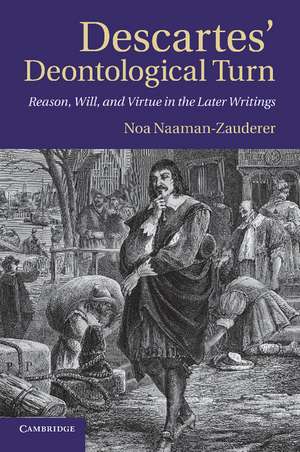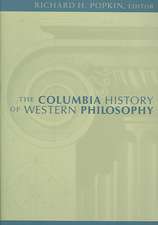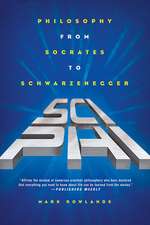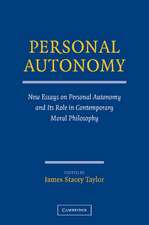Descartes' Deontological Turn: Reason, Will, and Virtue in the Later Writings
Autor Noa Naaman-Zaudereren Limba Engleză Paperback – 18 sep 2013
| Toate formatele și edițiile | Preț | Express |
|---|---|---|
| Paperback (1) | 313.62 lei 6-8 săpt. | |
| Cambridge University Press – 18 sep 2013 | 313.62 lei 6-8 săpt. | |
| Hardback (1) | 437.40 lei 6-8 săpt. | |
| Cambridge University Press – 3 noi 2010 | 437.40 lei 6-8 săpt. |
Preț: 313.62 lei
Nou
Puncte Express: 470
Preț estimativ în valută:
60.02€ • 62.43$ • 49.55£
60.02€ • 62.43$ • 49.55£
Carte tipărită la comandă
Livrare economică 14-28 aprilie
Preluare comenzi: 021 569.72.76
Specificații
ISBN-13: 9781107692077
ISBN-10: 1107692075
Pagini: 238
Ilustrații: black & white illustrations
Dimensiuni: 152 x 229 x 13 mm
Greutate: 0.32 kg
Editura: Cambridge University Press
Colecția Cambridge University Press
Locul publicării:New York, United States
ISBN-10: 1107692075
Pagini: 238
Ilustrații: black & white illustrations
Dimensiuni: 152 x 229 x 13 mm
Greutate: 0.32 kg
Editura: Cambridge University Press
Colecția Cambridge University Press
Locul publicării:New York, United States
Cuprins
Preface; Abbreviations; Introduction; 1. Looking inward: truth, falsehood, and clear and distinct ideas; 2. Error in judgment; 3. Free will; 4. Free will and the likeness to God; 5. From intellectual to practical reason; 6. Descartes' deontological ethics of virtue; References; Index.
Recenzii
'This book's uncovering of the deontological aspects of Descartes' thought represents an original and worthwhile contribution to Cartesian scholarship. It is a rich, tightly argued and carefully researched book that accomplishes its proposed goals of inviting scholars to reconsider Descartes' views in light of deontological considerations and of opening up fresh avenues and perspectives of inquiry.' Andreea Mihali, Philosophy in Review
'Descartes' Deontological Turn is a thorough piece of scholarship. The book is well researched and well written. Above all, Naaman-Zauderer has offered us an astute defense of many controversial interpretations of Descartes.' Eric Stencil, Journal of the History of Philosophy
'Descartes' Deontological Turn is a well-focused and up-to-date contribution to a set of debates in Cartesian scholarship that reinserts Descartes' epistemological and metaphysical thought in the broader context of his theological and ethical pre-occupations.' Richard Davies, Universita degli Studi di Bergamo
'… this book is a very significant contribution to Cartesian studies - a 'must read', in my opinion, for faculty or graduate students interested in the topics it addresses … According to Naaman-Zauderer, her goal in the book is 'to open up a new way of approaching a wide cluster of long-debated issues in Descartes' epistemology and ethics' … She not only makes a brilliant effort toward this goal, but achieves it.' C. P. Ragland, Notre Dame Philosophical Reviews
'Noa Naaman-Zauderer's Descartes' Deontological Turn is a brilliant book. It is lucid in explanation and elegantly written, achieving a level of originality and mastery of her subject that significantly reshapes our understanding of central aspects of Cartesian metaphysics and epistemology, as well as ethical theory.' Thomas Vinci, IYYUN: The Jerusalem Philosophical Quarterly
'[This book's] thorough presentation of current English-language Descartes scholarship on a wide range of topics and its careful collation of numerous passages relevant to the topics of error,freedom, and ethics should make [it] useful to Descartes scholars and especially to graduate students.' Sean Greenberg, University of California, Irvine
'Descartes' Deontological Turn is a thorough piece of scholarship. The book is well researched and well written. Above all, Naaman-Zauderer has offered us an astute defense of many controversial interpretations of Descartes.' Eric Stencil, Journal of the History of Philosophy
'Descartes' Deontological Turn is a well-focused and up-to-date contribution to a set of debates in Cartesian scholarship that reinserts Descartes' epistemological and metaphysical thought in the broader context of his theological and ethical pre-occupations.' Richard Davies, Universita degli Studi di Bergamo
'… this book is a very significant contribution to Cartesian studies - a 'must read', in my opinion, for faculty or graduate students interested in the topics it addresses … According to Naaman-Zauderer, her goal in the book is 'to open up a new way of approaching a wide cluster of long-debated issues in Descartes' epistemology and ethics' … She not only makes a brilliant effort toward this goal, but achieves it.' C. P. Ragland, Notre Dame Philosophical Reviews
'Noa Naaman-Zauderer's Descartes' Deontological Turn is a brilliant book. It is lucid in explanation and elegantly written, achieving a level of originality and mastery of her subject that significantly reshapes our understanding of central aspects of Cartesian metaphysics and epistemology, as well as ethical theory.' Thomas Vinci, IYYUN: The Jerusalem Philosophical Quarterly
'[This book's] thorough presentation of current English-language Descartes scholarship on a wide range of topics and its careful collation of numerous passages relevant to the topics of error,freedom, and ethics should make [it] useful to Descartes scholars and especially to graduate students.' Sean Greenberg, University of California, Irvine
Notă biografică
Descriere
This book reconsiders the place that the will occupies in Descartes' mature epistemology and ethics.














